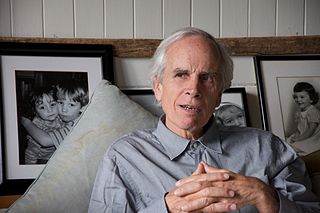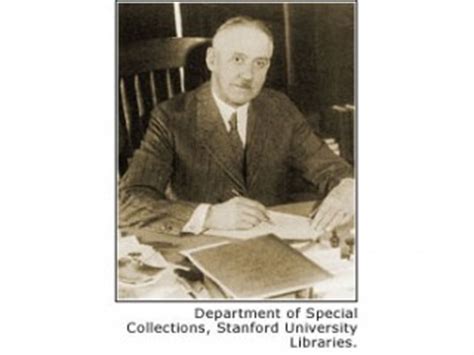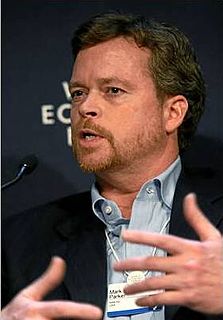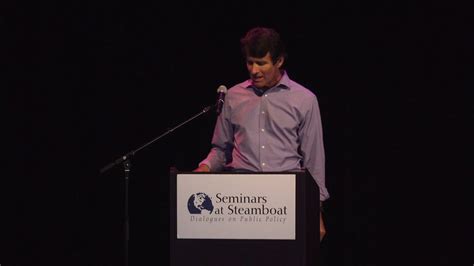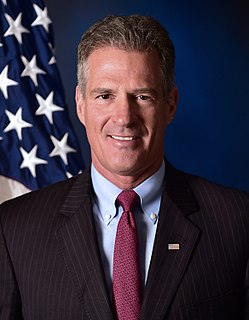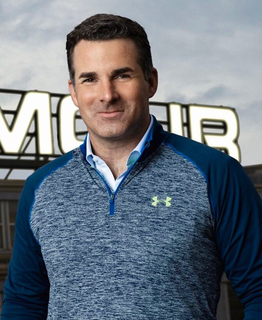Top 667 Manufacturing Quotes & Sayings - Page 10
Explore popular Manufacturing quotes.
Last updated on November 25, 2024.
The territorial aristocracy of former ages was either bound by law, or thought itself bound by usage, to come to the relief of its serving-men and to relieve their distresses. But the manufacturing aristocracy of our age first impoverishes and debases the men who serve it and then abandons them to be supported by the charity of the public.
More than any single action by the government since the end of the war, this one would change the face of America with straightaways, cloverleaf turns, bridges, and elongated parkways. Its impact on the American economy-the jobs it would produce in manufacturing and construction, the rural areas it would open up-was beyond calculation.
The computer is a mechanism for acceleration: it accelerates economic activity, and this is eating up the world. It's eating up resources, it's processing, it's manufacturing, it's distributing, it's consuming. That's what the computer's real work does, and it does that 24/7, 365 days a year, non-stop, just to satisfy our own narrow needs.
The very notion that millions of workers displaced by the re-engineering and automation of the agricultural, manufacturing, and service sectors can be retrained to be scientists, engineers, technicians, executives, consultants, teachers, lawyers and the like, and then somehow find the appropriate number of job openings in the very narrow high-tech sector, seems at best a pipe dream, and at worst a delusion.
That a country, [England], eminently distinguished for its mechanical and manufacturing ingenuity, should be indifferent to the progress of inquiries which form the highest departments of that knowledge on whose more elementary truths its wealth and rank depend, is a fact which is well deserving the attention of those who shall inquire into the causes that influence the progress of nations.
I don't like stuff that can only go into one set; I want stuff that can be applied across sets. It's a more real Lego building experience. And, of course, it's the same from a manufacturing point of view. I want elements that are universal; that gives me the best economics and best utilisation of the mould.
It requires a different holistic approach and a recognition that it's not simply a question of stepping into China's shoes. Our 'Make in India' has to be different from China's in the sense that we have to do a 'taal-mel' or 'jugalbandi' of our IT skills that exist and our evolving manufacturing skills and become intelligent manufacturers.
As industries migrate toward the Far East, the future of many Western cities will no longer lie in manufacturing products but ideas and patents. Young, mobile elites can choose where they want to live, and they can easily move, which means that cities are involved in a heated competition for the best people. Only the most attractive cities can benefit from this development.
I am passionate about what design can do - how far it can support the new ideas and the new ways of living of this 21st Century. Good design accelerates this exciting future where manufacturing is local, materials and processes are cradle to cradle, business models are both socially and financially driven.
What I hear from employers day in and day out is, 'I need to make sure I have that skilled workforce to compete.' And so we've been able to help so many people punch their ticket to the middle class by transforming our workforce development system for advanced manufacturing jobs and other critical jobs that exist right now.
Strike against war, for without you no battles can be fought. Strike against manufacturing shrapnel and gas bombs and all other tools of murder. Strike against preparedness that means death and misery to millions of human beings. Be not dumb, obedient slaves in an army of destruction. Be heroes in an army of construction.
The premise of most media is that only conflict is newsworthy. And that's just not true. I think for a lot of men, too - certainly for most women - there's enough real conflict without manufacturing it. The media formula is always to have a pro and con, to say there are two sides to any issue, when in fact there may be ten sides.
A lot of times, I can put a product together with a distributor when I go into my Rolodex for distributors. I can then put it together with a face, such as an artist. And then I can go into my databank of retailers and people that I've been working with through the years of retail, and then also manufacturing.
The US has developed two coordinate governing classes: the one, called 'business,' building cities, manufacturing and distributing goods, and holding complete and autocratic power over the livelihood of millions; the other, called 'government,' concerned with preaching and exemplification of spiritual ideals, so caught in a mass of theory, that when it wished to move in a practical world it had to do so by means of a sub rosa political machine.
Well, I think we are seeing some shifts in manufacturing. China, when you go in and you talk to the big manufacturers there, the biggest problems in mainland China are recruiting and retention. There isn't an endless supply of cheap labor anymore in China. And it's now true that the labor rates in Mexico are lower than in China.
Our schools are, in a sense, factories, in which the raw products (children) are to be shaped and fashioned into products to meet the various demands of life. The specifications for manufacturing come from the demands of twentieth-century civilization, and it is the business of the school to build its pupils according to the specifications laid down.
What we have seen for a very long time is large corporations shutting down plants in this country, plants that are often profitable, in order to get cheap labor all over the world. And that is one of the reasons why the middle class in this country is disappearing.We have lost our manufacturing base, and that's an issue that has got to be dealt with.
I never considered the clothing business in college. But my father was a manufacturer of men's wear in the Northeast and wanted to investigate manufacturing in Asia. In 1972 he sent me to Japan, Taiwan, and Hong Kong for four months. I'm convinced it was his way of getting me into business, rather than letting me be a hippie.
Business schools tend to focus on topics that are suitable to blackboards, so they overemphasize organization and finance. Until very recently, they virtually ignored manufacturing. I think of lot of the troubles of the 1970s and 1980s, and now more recently the 2000s can be traced pretty directly to the biases of the business schools.
The great interests of an agricultural, commercial, and manufacturing nation are so linked in union together that no permanent cause of prosperity to one of them can operate without extending its influence to the others. All these interests are alike under the protecting power of the legislative authority, and the duties of the representative bodies are to conciliate them in harmony together.
Sustainability at Nike means being laser-focused on evolving our business model to deliver profitable growth while leveraging the efficiencies of lean manufacturing, minimizing our environmental impact and using the tools available to us to bring about positive change across our entire supply chain.
The terrorists who have succeeded in carrying out spectacular attacks against Western targets in the past have been college-educated, technically proficient men who are capable of manufacturing and deploying chemical, radiological, and biological weapons. Al Qaeda attracts the kind of highly educated men who one day might be able to pull off such an attack.
At least since the Industrial Revolution, the world of design has been dominated by the rigors of manufacturing and mass production. Assembly lines have dictated a world made of parts, framing the imagination of designers and architects who have been trained to think about their objects as assemblies of discrete parts with distinct functions.
As homeowners see the value of their homes decline, they become more likely to delay purchases of the big items - like automobiles, electronics and home appliances - that are ballasts of the American economy. When those purchases decline, large manufacturing firms, suddenly short on funds, could begin laying off employees.
Let me tell you the story about Massachusetts under Governor Romney. It did fall to 47th out of 50 in jobs creation. Wages went down when they were going up in the rest of the country. He left his successor with debt and a deficit, and manufacturing jobs left that state at twice the rate as the rest of the country.
The very phrase 'Make America great again' implies some kind of reset to a time long since passed. A mission to restore America to a previous default setting where American economic superiority was without peer, factories and manufacturing plants were humming, and jobs were plentiful for anyone who wanted one.
There are those who say the music industry must adapt to a wired world. They point to the decades-long rise in CD prices, even as manufacturing costs came down, and to data that shows Napster may actually increase sales of CDs by music-hungry customers as evidence that the music industry is simply afraid of a new technology.
The dangers of TATP bombs can be seen in the case of Matthew Rugo and Curtis Jetton, 21-year-old roommates in Texas City, Texas. They didn't have any bomb-making training and were manufacturing explosives in 2006 from concentrated bleach when their concoction blew up, killing Rugo and injuring Jetton.
I think what is true is that there's been an underlying division in the United States. Some of it has to do with the fact that economic growth and recovery tends to be stronger in the cities and in urban areas. In some rural areas, particularly those that were reliant on manufacturing, there has been weaker growth, stagnation, people feeling as if their children won't do as well as they will.
Young man, nature is not frightening, it's people who are frightening! You just need to get to know nature and it will become friendly. This creature known as man is of course highly intelligent, he's capable of manufacturing almost anything from rumours to test-tube babies and yet he destroys two to three species every day. This is the absurdity of man.
There's almost 70 billion in square feet under construction in high rises in commercial, residential and light manufacturing. And we estimate about 30 billion square feet, and that's with a 'B,' is commercial, that we would just consider office space. To put that in perspective, that's a 5x5-foot cubicle for every man, woman and child in China.
So much of the trouble is because I am a woman. To me it seems a very terrible thing to be a woman. There is one crown which perhaps is worth it all--a great love, a quiet home, and children. We all know that is all that is worthwhile, and yet we must peg away, showing off our wares on the market if we have money, or manufacturing careers for ourselves if we haven't.
Batley and Spen has a high proportion of people working in manufacturing, and we can boast the full range of industries, including high-skilled, precision engineering. We manufacture all sorts, from beds to biscuits and from carpets to lathes. We also have some of the best fish and chips in the country and some of the best curries in the world.
Ohio suffered, like a lot of Midwestern states, under the weight of trade deals that really diminished a lot of good-paying manufacturing jobs; a lot of the blue collar workers in the state are suffering, just like many of their counterparts across the country. I'm not terribly surprised that Mr. Trump won Ohio.
Look at Germany where 20 percent of the labor force is in manufacturing compared to about 8 percent in the United States. Germany pays a lot more conscious attention at the level of the federal government to attracting and keeping manufacturers in Germany. So this is something that other countries do that the United States has not historically done.
Union membership is not the sole guarantor of job security and a living wage, but nonunion factory workers do not enjoy the same protections as union workers. They're subject to exploitation, underpayment and lower standards of workplace safety - which is also often the case for manufacturing workers outside the United States.
Because I am a part of the Big Picture, I do matter and substantially so. Because I am only a part, however, I am rightly situated off to stage right—and happily so. What freedom there is in such truth! We are inherently important and included, yet not burdened with manufacturing or sustaining that private importance. Our dignity is given by God, and we are freed from ourselves!
Sadly, at Ford, General Motors, and Chrysler sales continually trend downward, manufacturing costs rise, and employment declines. As the result of the decrease in the number of cars produced by American manufacturers, membership in the United Auto Workers has dropped from a high of over 1.5 million thirty years ago to less than half a million today.
Samasource creates jobs in regions where more traditional forms of employment in low-income economies, such as manufacturing, are difficult to scale because of poor infrastructure. In a village in Rukka, India, for example, our small data entry partner employs over 60 people doing various types of Internet research for Samasource.
I've criticized President Bush for his failure to use his veto pen. There's plenty of blame to go around. The question is how to solve problems. It's not bailouts. What made America great? Free markets, free enterprise, manufacturing, job creation. That's how we're gonna do it, not by enlarging government.
My family was in two businesses - they were in the textile business, and they were in the candy business. The conversations around the dinner table were all about the factory floor and how many machines were running and what was happening in the business. I grew up very engaged in manufacturing and as part of a family business.
The great cry that rises from our manufacturing cities, louder than their furnace blast, is all in very deed for this, that we manufacture everything there except men; we blanch cotton, and strengthen steel, and refine sugar, and shape pottery; but to brighten, to strengthen, to refine, or to form a single living spirit, never enters into our estimate of advantages.
Our cultural industries are our biggest export, our biggest manufacturing base. Every pound spent on art education brings disproportionately large returns. It's the biggest bang for our buck. If it ain't broke, don't fix it. In fact, the more you put in, the greater the successes for the U.K. economy.
There's an entrepreneur right now, scared to death, making excuses, saying, 'It's not the right time just yet.' There's no such thing as a good time. I started an apparel-manufacturing business in the tech-boom years. I mean, come on. Get out of your garage and go take a chance, and start your business.







